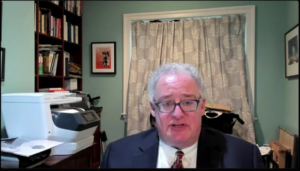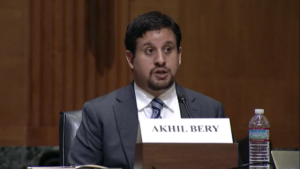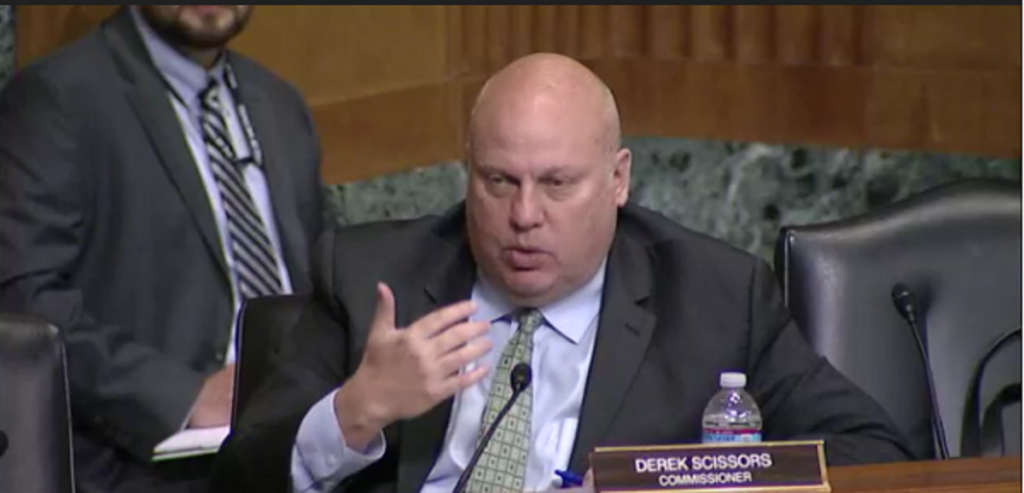Active pharmaceutical ingredients (API) and trade deals were two issues repeatedly brought up during the U.S. China Economic and Security Review Commission’s hearing on Thursday.
And while none of the commissioners or panelists hinted about reshoring, concern over India’s reliance on China for key starting materials (KSM) and, increasingly, for API as well, was seen as a headwind for the U.S.
“About 65% of all API in India comes from China. Imports are cheaper than what India can do. If geopolitical tensions continue, China could stop exporting critical products like API to India,” warned Akhil Bery, director of South Asia Initiatives at the Asia Society Policy Institute. [Testimony]

Commissioner Michael Wessel.
“The value of Indian pharmaceutical ingredients — to me — is a matter of healthcare security. We are seeing a lot of China products coming into India and then they come here and to me that is a question of our health security,” said Michael Wessel, one of the Commissioners.
Derek Scissors, another Commissioner, said, “If the Chinese cut the Indians off, India pharmaceuticals selling to the U.S. would be hurt. And if China did that to the U.S. directly, they would have to cut off India as well,” he said, adding that India needed to move off China for KSM.
There was no talk about the U.S. relying less on India, which, according to the Commission, was increasingly piped into China for both API and KSM – the main building blocks of medications that get turned into pills, tablets and injectables.
The panel was one of four panels in this week’s hearing titled China’s Activities and Influence in South and Central Asia.
The three panelists were all India experts, with India being the center-piece discussion in the third panel titled China’s Influence in Continental South Asia.
The question was how to get India to see things more similarly to Washington? On many topics that were already the case. Prime Minister Narendra Modi was close to former president Trump, the panelists recalled. But the country is big, and opposition parties on the right and the left have their own reasons for not wanting to follow in Washington’s footsteps too closely.
Geopolitically, Washington considers India the sole counterweight to China’s soft power in South Asia.

Maybe do something with the Section 232 tariffs against Indian steel and aluminum, said Bery. Or not.
Bery said that one way to get India more in line with the U.S. was to remove Section 232 tariffs on steel and aluminum, put in place under Trump. But deeper dives on the issue of trade discussed throughout the panel suggested that India is not interested in sweeping trade deals, or bilateral free trade agreements.
“I read their free trade agreement with the U.K.,” Scissors commented. “It’s a snoozer. I wish I could have the time I spent reading it back.”
Scissors pushback on trade deals being a solution to countering China. “There are some ‘unnecessary barriers’ we can engage on and improve on, but not a big trade deal,” Scissors said.
“No, no free trade agreement,” Bery responded. “That would be wrong to consider.” He said Modi was focusing on more “self-sufficiency” as a matter of national economic policy.
The U.S.-led Indo-Pacific Economic Framework, or IPEF, has been discussed in India, but until the main pillars of that agreement are known, IPEF remains a topic for diplomatic missions and the U.S. Chamber of Commerce.
Tanvi Madan, director of The India Project at the Brookings Institution Madan [Testimony] said South Asia will not be upset if IPEF or a new type of Trans-Pacific Partnership on trade failed to make headway.
“You are not going to see any disappointments if there is no trade component (to IPEF),” Madan said. “I think the countries (in South Asia) are going to want a more plug-and-play coalition model. Countries will engage according to their comfort levels,” she said, adding that she doubted smaller countries in South Asia, like Nepal and Bangladesh, were ready for open markets.
The India-China trade relationship is as one-sided as the U.S.-China one. It favors China-based exporters.
The trade deficit with China is recognized as a political problem in India, just like it is here. And India is having a challenging time reducing its reliance on China for goods, namely electronics, API, medical supplies, chemicals, and computers. India’s mobile phone revolution and its solar industry are all reliant on China inputs.
“China has isolated Southeast Asia and is curbing influence in the region,” said Madan.
The old Asian Tigers are largely outposts today of Chinese multinationals or are outsourcing partners to Chinese manufacturers for everything from solar equipment to furniture.
“Beijing considers U.S. ties with India as a challenge to them in South Asia,” Madan said. “It sees most American actions there as complicating greater Chinese influence.”
Generic Drug Shortages and How a Race to the Bottom in Price has Upended 30 years of Hatch-Waxman













